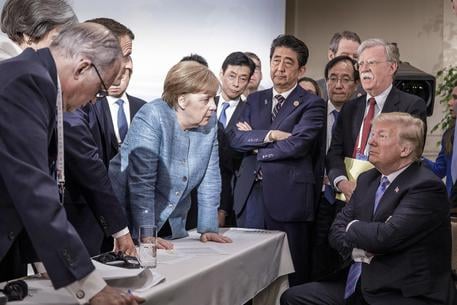Commentary
Nationalism disguises itself as resistance to globalization
What escapes nationalist discourse is the fact that this awakening of nationalism, beyond its appearance, does not undermine neoliberalism and its globalizing inspiration.

There is a widespread disagreement that risks to compromise the understanding of some contemporary processes and, above all, the capacity to resist them. It is about the erroneous collocation of a ‘sovereign rebirth’ in a nationalistic sense with respect to the dynamics of globalization and neoliberalism.
Frequently, this misunderstanding is at the center of the discourse that, denying the awakening of such nationalism, tends to prefer, as in a rigid and hopeless alternative, the neoliberal policies to which such nationalism claims to combat.
Therefore, one could add to this first misunderstanding a second one: the inability to conceive a constructive internationalism that, escaping the structural limits of nationalist supremacy, does not fall under the support of globalization as a unique and thus good scenario.
In this regard, it is by clarifying this dichotomy between internationalism and globalization that we should start. The first consists of an extension of the political space beyond the limits of the sovereign state; the second consists of an extension of the social dynamics and circulation of interests beyond those same borders, often causing—if not always—an erosion of the political and juridical decisional capacity.
In other words, we can say that the two processes relate in a kind of inverse proportionality, despite they both insist on a wider dimension than that of the sovereign state. On the one hand, internationalism assumes the creation of a constructive capacity in political terms; on the other, globalization refers to the defense of interests within international dynamics. In this regard, the fundamental misunderstanding arises from the fact that the two phenomena propose a discourse that goes beyond the nation-state.
Indeed, it is evident that the nation-state, born in a specific historical phase, has had an aggregating function for the citizens who, without the national sentiment, would never have felt the possibility of participating in a political arena.
However, nowadays the national dimension is outdated. In part, because it has wisely separated itself from state discourse, making the boundaries of public and political debate porous in an inclusive sense. And because transnational, international and intranational issues undermine its solidity and the rigid relationship between state and nation present in its original form.
Internationalism discards the tendency to consider political questions on a national scale, and promotes the widening of the political reflection. Equally, globalization breaks down the boundaries of the nation-state, much more effectively than internationalism, thanks to its almost naturalistic expansive capacity, decentralizing the circulation of economic interests to a matrix that is both local and global.
How, then, can we interpret the overbearing return of the national question?
Nationalistic rhetoric disguises itself as resistance against globalizing processes, regaining national sentiment in order to defend the decision-making capacity typical of the political agreement of the modern nation-state.
As much as internationalism, nationalism also postulates the fear of the citizens to renounce to their political capacity. While internationalism adheres to the global reality, nationalism demands an awakening of national sentiment as a wall erected against globalization and neoliberal discourse.
However, what escapes nationalist discourse and what must be placed at the center of a serious confrontation with nationalism is the fact that this awakening of nationalism, beyond its appearance, does not undermine neoliberalism and its globalizing inspiration.
What really must become clear is the functioning of neoliberalism, which for too long has been confused with a return to an economic laissez faire. In reality, neoliberalism is a rigid regulatory force for the states that promotes the ideas of responsibility, atomization, and entrepreneurship, within the life of every citizen, in all their dimensions, including private and emotional ones.
In this perspective, the state does not die at all in the neoliberal environment, but, on the contrary, becomes stronger. However, it loses its sovereign dimension and becomes subjected to the task of the neoliberal globalism.
A task that nationalism accepts and corroborates, increasing the national-state structures that are completely at the service and functionalized to the neoliberal discourse.
In this regard, one can think of the most evident dimension of nationalistic activism, that is, the erection of walls, physical or cultural, the opening of camps, in order to defend national interests. An initiative that, far from being anti-globalist, normalize the underlying discourse of neoliberalism, which transforms people into costs and benefits, and unites them in a single homogeneous flow to be carefully controlled according to the needs of the global market, of which the domestic market is an active part.
Therefore, nationalism and sovereignty are part of a crisis of neoliberal globalization according only to this misunderstanding.
But, it is not true, and believing this way means collaborating in the nationalist illusion that this would be an innovative attempt to resist the neoliberal dynamics that the poor, the worker, the middle class can join.
An illusion that has already had too much success, for example with the victory of Trump and even in Europe and Italy.
Originally published at https://ilmanifesto.it/il-sovranismo-si-traveste-nella-resistenza-al-global/ on 2018-06-27
